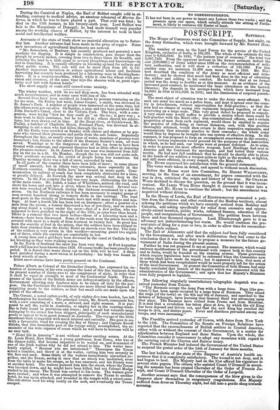POSTSCRIPT. SITtrane.r.
The House of Commons went into Committee of Supply, last night, on the Army Estimates, which were brought forward by Mx. SIDNEY HER- BERT. The House of Commons went into Committee of Supply, last night, on the Army Estimates, which were brought forward by Mx. SIDNEY HER- BERT.
The number of men in the Land Forces for the service of the United Kingdom, exclusive of India, is 102,283. The whole of the estimate for this year is 6,025,0161. In 1835, "the pattern year of economy," the total was 5,907,7824 From the apparent increase in the former estimate deduct the cost (250,0001.) of items added since 1835 on the recommendation of mili- tary authorities, and it will show a reduction of 132,7661. For this smaller sum we maintain 21,000 men more than in 1835. Mr. Her- bert described the condition of the Army as most efficient and satis- factory; and he showed that much had been done in the way of educating the soldier and adding to his comfort. He believed that at no former period was the Army so healthy as at this moment. As an evidence of the increased good conduct, he mentioned the large attendance on the barrack libraries the deposits in the savings-banks, which have increased from 14,8491. in 1844 to 111,9201. in 1852; and the diminution of corporal punish- ment.
The next object of attention was to snake the Army more efficient. We used our army too much as a police force, and kept it spread over the coun- try in detachments, without opportunities for field-practice ; so that the men had no chance of seeing two regiments brigaded together, or of ma- nceuvering on a large scale. This very great defect he proposed to remedy. A very small sum would suffice to provide a station where there could be ball-practice with the Minie rifle; non-commissioned officers, and a certain proportion of men from each regiment, would there be enabled to acquire the practice of rifle-firing at various distances, and, with this practice thoroughly attained, would then return to their respective regiments, and communicate that scientific practice to their comrades ; the whole army would thus by degrees be brought into one system of effective firing. In the summer, it was proposed to form an encampment somewhere in the country, whither various regiments would proceed for the purposes of that instruction in which, as he had said, our troops were at present deficient. As to arms, in order to procure the most effective weapons, Lord Hardinge had sent to America and the Continent for specimens, and had tested their various merits. He had now full confidence that he should be shortly able to place in the hands of our soldiers a weapon quite as light as the musket, or lighter, and still more efficient, in every respect, than the Minie rifle. Mr. Hiram expressed his satisfaction with the general statement. The votes were taken in detail, and agreed to without much discussion.
Before the House went into Committee, Sir HENRY WILLOUGHBY, moving, in the form of an amendment, for papers connected with the war in Ava, criticized the origin and history of the war. Sir Calm= WOOD declined to discuss the question, on the ground that it was incon- venient. Sir Samos WEIR Ikea thought it necessary to enter into a defence, and Mr. HUME to continue the attack; but the amendment was negatived without division.
In the House of Lords, the Earl of ELLENBOROUGH presented a peti- tion from the Natives and other residents of the Madras territory, almost echoing the petitions which we have recently noticed from Bombay and Calcutta, and asking specifically for relief from excessive and oppres- sively-raised taxation, public works, reformed finance, education of the people, and reorganization of Government. The petition bears between three and four thousand signatures. Lord Ellenborough gave to it an advocacy not indiscriminating but warm. He would continue the pre- sent state of thing for a year or two, in order to allow time for reconsider- ing the whole subject.
The Earl of ABERDEEN said that the subject had been fully considered by the Government, and after much deliberation they had come to the conclusion that it was their duty to propose a measure for the future go- vernment of India during the present session. Farther he was not prepared to say at present. The measure, which would embrace modifications of the government with respect both to this country and to India, would be founded on the existing system. Those grievances which require legislation here would be redressed when the Committee now in action shall have made its report ; but it appeared to him, that most of those which had been recapitulated would be more properly left for the action of the local Government. At present the Committee of both Houses had only finally concluded that branch of the inquiry which was connected with the administration of the Government; and upon that her Majesty's Ministers were fully prepared to legislate.


























 Previous page
Previous page